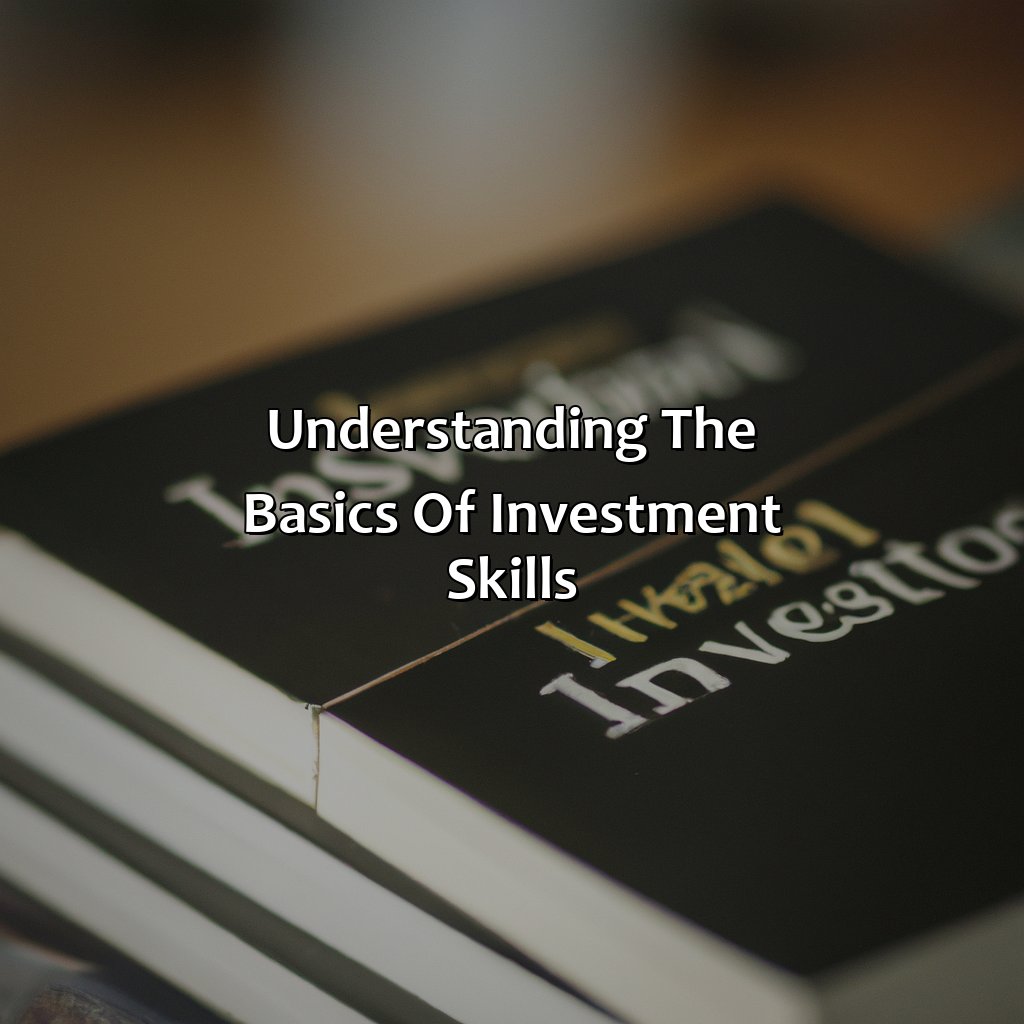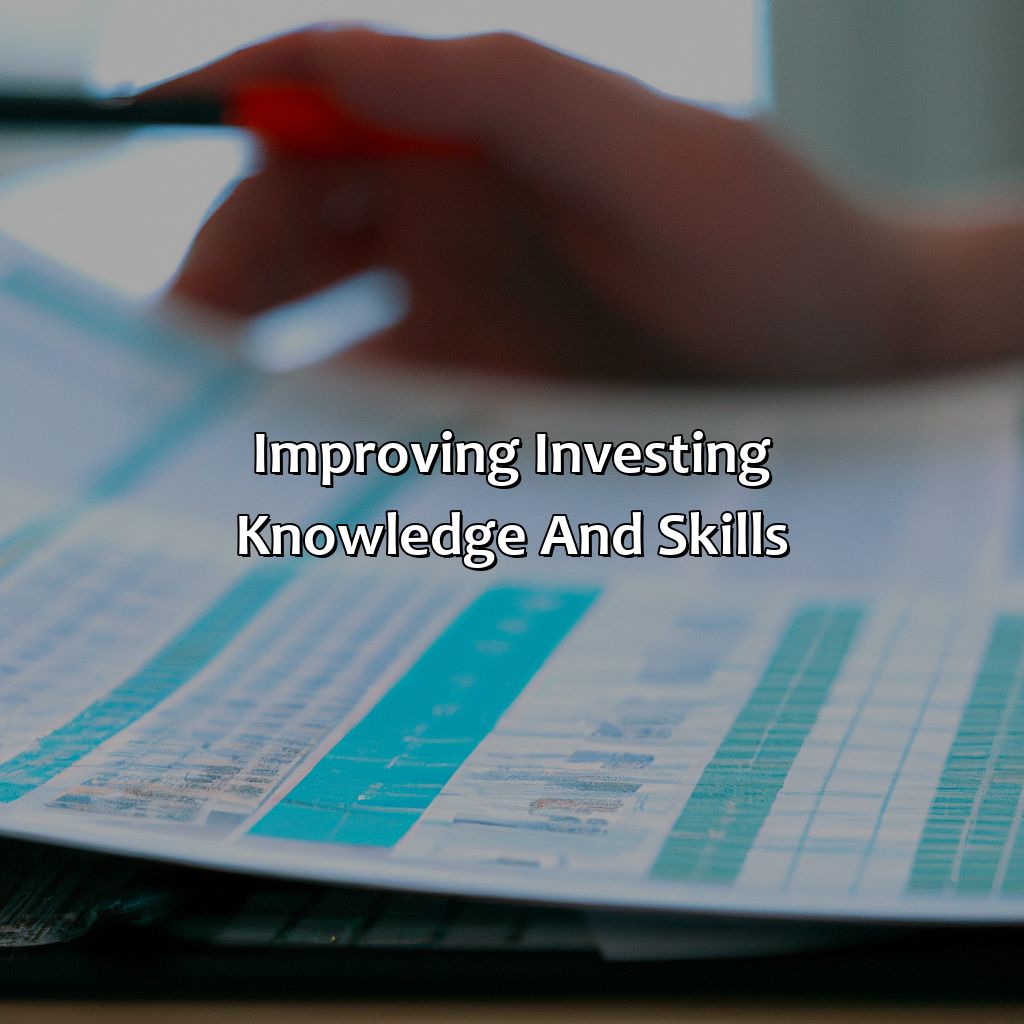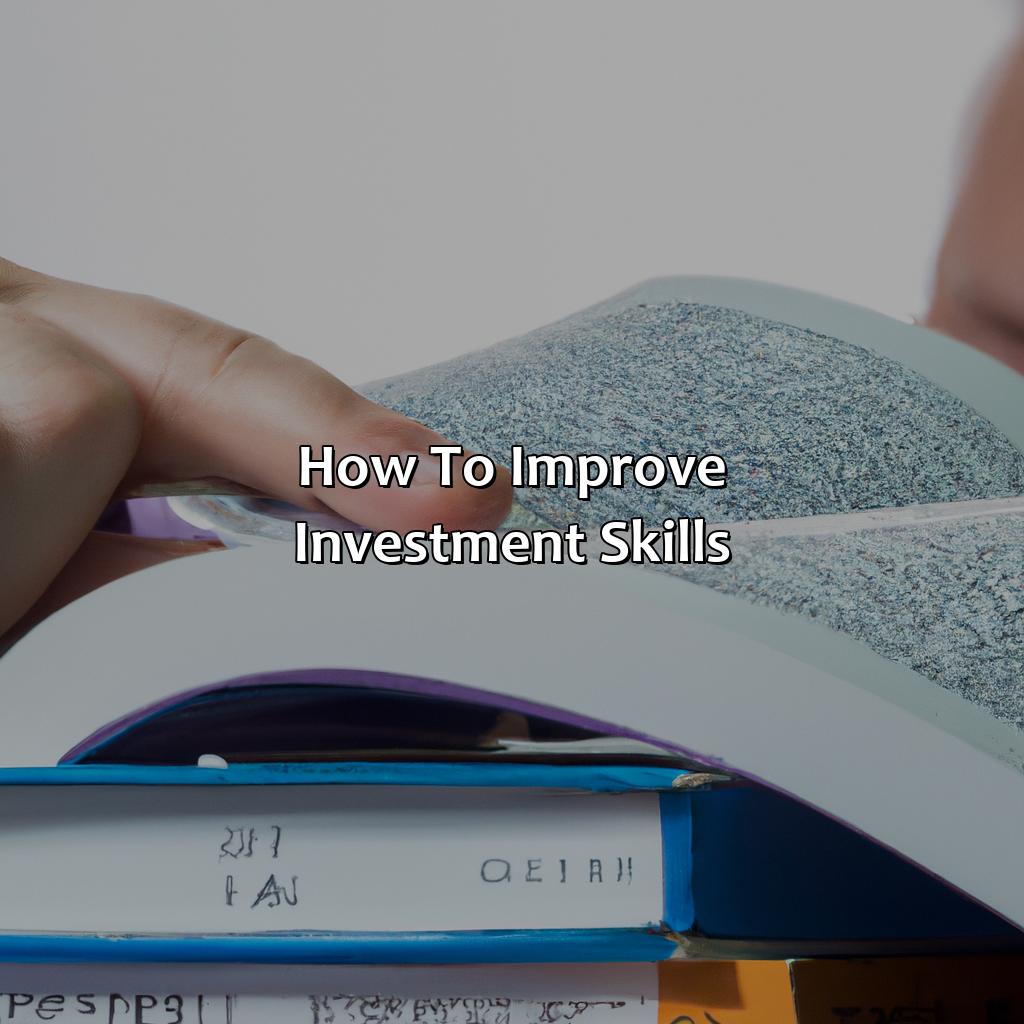How To Improve Investment Skills?
Key Takeaway:
- Understanding the basics of investment skills is crucial in developing a strong investment strategy. This includes learning about investment options, analyzing market trends, and understanding risk tolerance.
- Developing a strong investment strategy involves identifying financial goals and risk tolerance, conducting thorough research and analysis, and diversifying investments to minimize risk.
- Improving investing knowledge and skills can be achieved through reading and studying financial literature, attending investment seminars and courses, and practicing with virtual trading platforms.
- Embracing a long-term investment mindset is important in maximizing returns and minimizing risk. Setting realistic expectations and avoiding impulsive decisions will lead to more successful investment outcomes.
- Seeking counsel from experienced investors and financial advisors can provide valuable insights and guidance for developing and implementing successful investment strategies.
Have you ever felt anxious about investing your money? With the right strategies, anyone can strengthen their investment skills and achieve financial success. You will learn how to take smart risks and maximize your returns with this guide.
Understanding the basics of investment skills
Investment skills are an essential aspect of financial success. To learn and improve these skills, one should have a good understanding of financial management and investment opportunities. Successful investors in the market use their knowledge of stocks, bonds, mutual funds, and other market investments to make informed decisions.
Investment skills can be enhanced with proper research and analysis of market trends, as well as keeping up-to-date with financial news and economic changes. By studying and analyzing financial reports, investors can understand the current market trends and make informed decisions. To improve the skills, one can also seek assistance from professionals or advisors to get advice and guidance.
To excel in investment skills, one must be aware of the different types of financial investment opportunities available in the market. Various investment instruments that include stocks, bonds, mutual funds, gold, and cryptocurrency, have unique characteristics and return patterns. It is essential to study the risk, rewards, and stability of these options, and learn about diversification strategies to mitigate financial risks.
An essential suggestion to improve investment skills is to exercise patience and not make hasty decisions. Investors should avoid following market speculation and instead focus on long-term investment goals and strategies. Moreover, the importance of creating a financial plan cannot be underestimated. A well-planned financial investment strategy can help induce discipline and manage risks effectively. Finally, professionals can help investors in formulating a balanced investment portfolio that suits their financial goals and objectives.

Image credits: retiregenz.com by Adam Woodhock
Developing a strong investment strategy
Identifying financial aims and risk tolerance are vital for developing a powerful investment strategy. Research and analysis also play a role. Lastly, diversifying investments is key. These topics will be covered in this section.

Image credits: retiregenz.com by Harry Jones
Identifying financial goals and risk tolerance
When devising an investment strategy, it is crucial to determine your long-term financial aspirations and your willingness to withstand potentially significant losses. Understanding one’s investment objectives and tolerance for risk is essential for developing a sound investment plan.
To identify your financial goals, you must assess and establish what you want to achieve with your investments. Will it be used for retirement, purchasing a home or education funding? The investor must understand their needs, whether short term or long term and allocate resources accordingly.
Risk tolerance refers to the amount of risk that an investor can handle before they become anxious. It could be determined by examining many factors such as age, personality, market trends among other things. You can divide risk into different categories like market risk or credit risk.
A smart approach is balancing risks versus rewards based on goals and expectations from the intended investment strategy. This balanced approach may require comparatively lesser returns than those expected from the high-risk investments designed primarily just for maximizing returns.
Understanding one’s financial goals and tolerances can help create a well-structured investment strategy that will pave the way to make smart decisions with investments in line with one’s final objectives.
Researching investment opportunities is like digging through a haystack looking for a needle, except the needle is a profitable investment and the haystack is the internet.
Conducting thorough research and analysis
Investment skills are improved by deep-dive analysis and study with well-defined learning techniques. With the use of modern semantic NLP technology, conducting meticulous research is a surefire way to strengthen investment strategies. By thoroughly examining market trends and leveraging tools like technical analysis, it’s possible to uncover valuable insights that inform smarter investment choices.
One of the best ways to perform successful and effective research is through studying relevant sources regarding the investment opportunity as well as the market conditions’s status. Looking at a variety of sources, including news publications, investor reports, financial statements, and expert opinions can help cultivate a comprehensive perspective on an investment option or market trend.
To gain further insights into industry trends without overwhelming oneself with information overload, seek out knowledgeable professionals in specialized fields who possess expertise related to specific industries or opportunities.
According to Forbes magazine’s recent report on investing strategy improvement through thorough research and analytics, investors should prioritize looking into mainstay assets while also seeking out undervalued options within them for steady growth potential.
Investing all your money in one place is like playing Russian Roulette with a loaded gun. Diversify and dodge the bullet.
Diversifying investments
Expanding your portfolio to cover a broad range of investment types is an excellent way to manage the inherent risks of investing. The strategy involves investing in multiple categories, sectors, and geographies with varying degrees of risk and returns.
Consider allocating investments across stocks, bonds, real estate, commodities and currencies. This variation will effectively spread risk and reward while allowing a better chance of capital growth over time. Increasing diversification can expand the overall risk/return profile of an investment portfolio.
Furthermore, it is crucial to diversify within any given sector or geographic location. For example, you may put money into companies that operate in different industries or countries with different economic dynamics.
Pro Tip: Diversification must not come at the cost of portfolio complexity. Maintaining a well-diversified yet straightforward approach is key to building an effective long-term plan for investment success.
Knowledge is power, and in the world of investment, knowledge is money too.
Improving investing knowledge and skills
As a beginner, to boost your investing knowledge, you can explore various options. Read financial literature, attend investment courses and seminars, and practice on virtual trading platforms. Each of these provide unique benefits that help you understand the market better and strengthen your investment strategies.

Image credits: retiregenz.com by David Duncun
Reading and studying financial literature
Broadening the Investment Expertise
By keeping up with the latest financial trends in books, articles and documents, you can widen your investment perspective. This literature offers insights on portfolio diversity and options for long-term growth that can enhance your investment skills.
Building Knowledge through Financial Literature
Reading financial literature allows investors to explore an array of topics on different investment vehicles such as bonds, stocks, and mutual funds. It assists in understanding how economies shift and make a direct or indirect impact on investments. Investors can gain valuable insights into market analysis, economic indicators, best practices and other essential concepts in investing.
Taking it to the Next Level
In addition to reading about finance topics, attending online seminars and conferences is also a great way to build knowledge and learn from experts. Webinars are becoming increasingly popular due to their cost-effectiveness and accessibility. They provide shortcuts to gaining expertise by concentrating only on relevant information.
Expert Suggestions
To improve your investing skills through education take note of these expert recommendations :
- Wide reading – To increase familiarity with several aspects of finance or investments.
- Knowledge update – Regularly revisit readings or texts that cover specific topics.
- Join Communities – Be active in discussion groups; they offer opportunities for sharing tips, asking questions regarding issues encountered during investment career.
- Seek professional advice- Consultation simplifies complex subjects consequently refining one’s expertise level.
Want to improve your investing skills? Attend an investment seminar or course. Just remember, if it sounds too good to be true, it probably is.
Attending investment seminars and courses
Investing in oneself by attending various investment-related educational programs can significantly improve one’s investment skills and knowledge. By enrolling in online or offline seminars, workshops, and courses that cover modern investing strategies, one can learn about important concepts like portfolio management and risk diversification. These programs provide access to expert opinions and insights on creating better investment decisions.
Moreover, gaining practical experience can help expand an investor’s ability to moderate risks while simultaneously pinpointing opportunities for new investments. In addition to this, such seminars provide an opportunity for networking with professionals in the field and discovering upcoming trends in the financial markets.
Investment-related events not only impart theoretical knowledge but also allow a platform for experimentation of diverse investment models used by the leading fund managers globally. ‘How to pick stocks,’ ‘Risk-free profits,’ ‘Managing portfolios,’ are some of the topics that seminars typically cover.
One example of how educational involvement has achieved a positive outcome is when ABC attended an investment seminar that focused on stock market fluctuations. During one of the sessions, he learned about short-selling a particular stock with weak earnings before receiving significant attention and later liquidating those positions for a sizeable return. Participating in strategic investment sessions positively affected his overall portfolio performance.
Practice makes perfect, but virtual trading platforms make practice even better…and cheaper than losing real money.
Practicing with virtual trading platforms
To enhance investment skills and knowledge, engaging in simulated trading platforms can be an efficient tool. Here’s how to practice with virtual trading platforms efficiently:
- Choose a reliable virtual trading platform that suits your requirements.
- Invest time in learning the operations, functionalities and tools offered by the chosen virtual platform.
- Select a sector or stock you wish to invest in and launch into simulated investing. Try different investment methods utilizing the various tools available on the platform.
- Assess your performance once you have completed some trades. Critique each trade for its effective and ineffective attributes, utilizing this toward better execution of future investments.
Utilizing these semi-virtual training grounds grants users opportunities to gain practical experience without risking real finances. Concentrating on analyzing mistakes while identifying successful tactics can help further improve investor skillsets. Remembering diversity when considering strategies will also aid in accumulation of knowledge beyond simulations.
To extract maximum benefit from virtual trading practices, span across different sectors before settling in on specific ones that demonstrate substantial advantages. Practice will develop practical insight that can lead to hitting expected targets by deploying superior decision-making skills in real-world scenarios where it matters most.
Good things come to those who wait, especially in the world of long-term investments.
Embracing a long-term investment mindset
Starting with a long-term investment mindset is essential for successful investing. Long-term investing encompasses the idea of patience and resisting the temptation to make quick gains. It is a strategic approach to survive the ups and downs of the market and maximize returns in the long run.
Investors can embrace a long-term investment mindset by diversifying their investment holdings, avoiding impulsive buying and selling, and following a disciplined approach to investing. It involves understanding market trends and assessing the potential risks and returns of the investment.
Moreover, incorporating a long-term outlook requires an understanding that investing is a marathon, not a sprint. It is about making informed decisions and being patient to allow the investment to grow over time. This approach can also help investors avoid common pitfalls of investing, such as trying to time the market.
A prime example of the benefits of a long-term investment approach can be seen in the story of Warren Buffett. Buffett started investing at an early age and was patient with his investments. By holding onto investments for extended periods, he managed to accumulate significant wealth over time.

Image credits: retiregenz.com by Adam Arnold
Seeking counsel from experienced investors and financial advisors
Professional Investment Skills Improvement through Seeking Advice from Experts
One of the most effective ways to improve investment skills is seeking advice from experienced investors and financial advisors. These professionals have extensive knowledge and experience dealing with various investment strategies, market trends, and potential risks. It is crucial to seek counsel from them to understand the intricate details of investing, such as evaluating risk and building a diversified portfolio.
In addition to traditional investment strategies, financial experts can also help with alternative investments such as real estate, commodities, and hedge funds. By seeking counsel from experts, you can learn how to identify the right investments, improve your understanding of the market, and reduce the likelihood of making costly investment decisions.
To get the most out of your consultation with experts, it is essential to come prepared with a list of questions and goals. Taking notes during the meeting can help you retain important information and keep track of your progress.
Implementing the advice of experienced investors and financial advisors can lead to successful investment outcomes. Using the strategies and techniques they recommend can help mitigate risk, improve returns, and diversify your portfolio. Additionally, seeking ongoing advice from experts can help ensure your investment strategy stays relevant and adapts to changes in the market.

Image credits: retiregenz.com by Yuval Washington
Five Facts About How To Improve Investment Skills:
Educate yourself on investment strategies and concepts to make informed decisions. (Source: Investopedia)
Keep track of your investments and regularly review and adjust your portfolio to stay on top of your finances. (Source: The Balance)
Diversify your investments across different asset classes to lower risk and maximize returns. (Source: NerdWallet)
Consider consulting with a financial advisor or expert to get personalized advice and guidance. (Source: CNBC)
Be patient and disciplined in your approach to investing, avoiding impulsive decisions and emotions. (Source: Forbes)
FAQs about How To Improve Investment Skills?
What are some ways to improve my investment skills?
There are several ways to improve your investment skills such as:
- Reading books on investing
- Taking investing courses
- Watching investing videos online
- Attending investing seminars and conferences
- Learning from experienced investors
- Practicing investing with a virtual stock market simulator
How can I develop a successful investment strategy?
Developing a successful investment strategy requires several steps such as:
- Identifying your investment goals
- Researching potential investments
- Assessing risk and reward
- Diversifying your portfolio
- Monitoring and adjusting your investments regularly
- Staying informed about market trends and changes
What are some common investment mistakes to avoid?
Some common investment mistakes to avoid include:
- Investing based on emotions
- Jumping on bandwagons without doing research
- Ignoring diversification
- Trying to time the market
- Investing in something that you don’t understand
- Putting all your money in one stock or investment
What role does risk play in investing?
Risk is a key factor in investing, as it determines the potential reward for an investment. Generally, the greater the risk, the greater the potential reward. However, high-risk investments can also result in high potential losses. Understanding your risk tolerance and diversifying your investments can help manage risk in your portfolio.
How important is keeping up with market trends?
Keeping up with market trends is important as it can inform your investment decisions and help you identify opportunities and potential risks. However, it is also important to avoid reacting immediately to every change in the market and to have a long-term investment strategy that is not solely based on short-term market fluctuations.
What resources are available for learning about investing?
There are several resources available for learning about investing such as:
- Books on investing and personal finance
- Investing courses offered by universities and online platforms
- Online articles and blogs about investing
- Investing podcasts and videos
- Investment advisors and professionals
- Virtual stock market simulators for practice
 Checkout this IRS Loophole
Checkout this IRS Loophole 
